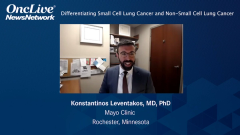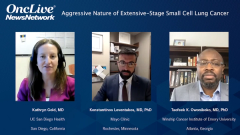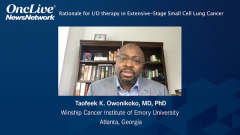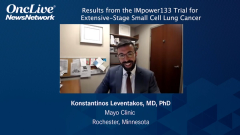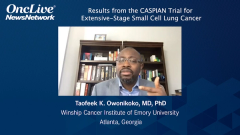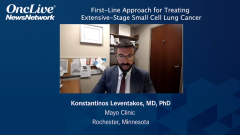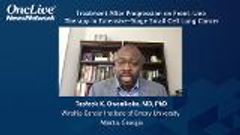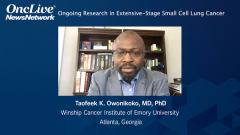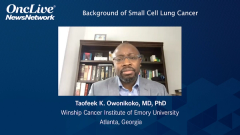
First-Line Approach for Treating Extensive-Stage Small Cell Lung Cancer
Episodes in this series

Kathryn Gold, MD: We’re fortunate to have multiple positive trials in small cell lung cancer. Keeping these trials and others in mind, what’s your standard first-line approach?
Konstantinos Leventakos, MD, PhD: At our institution, we have both the CASPIAN regimen and IMpower133, and it is a matter of being more flexible. If you want to do cisplatin, you can use the CASPIAN, but otherwise, I find that they are clinically equivalent. We’ve heard about palliative meaning of the treatment of this disease, but we now have the patient-reported outcomes from both studies published, one by Dr Aaron Mansfield and the other by Dr Jonathan Goldman. Both showed that patient-reported outcomes are very good with the addition of the immunotherapy and without compromising the quality of life. We have very strong data from patient-reported outcomes that both regimens are very good.
I have tried to scrutinize my colleagues and point out my own differences, but I don’t think we can find a lot of differences. The message is quite strong, that additional immunotherapy in our standard platinum etoposide improves outcomes.
Taofeek K. Owonikoko, MD, PhD: I would echo that, adding that this is my first-line treatment option for most of my patients. The only reason I wouldn’t use immunotherapy is if there are specific contraindications to immunotherapy or if the patient is not able to tolerate chemotherapy itself, and I know that just using immunotherapy is not likely to help. Some of the challenges that we currently face are like what we have for non–small cell lung cancer; we don’t have any reliable biomarker to help us identify patients. I don’t rely on testing for PD-L1 or tumor mutational burden to make the decision to use immunotherapy. The studies were not designed that way, and the analysis was not affected by PD-L1 or tumor mutational burden. I consider this to be low-yield, low-impact exploratory analysis.
I still get patients involved in the conversation the way we did when we had only chemotherapy. Now that we’re adding immunotherapy to the mix, we talk about the potential adverse effects of not only chemotherapy but also immunotherapy. Part of the initial hesitation with immunotherapy in small cell lung cancer was the concern of paraneoplastic syndrome getting reactivated by the use of checkpoint blockade. That has not been the case. From all the prospective trials we’ve seen, we haven’t seen any significant increase in the incidence of paraneoplastic syndrome when the chemotherapy with immunotherapy options were explored. Right now, this is my go-to regimen, chemotherapy plus immunotherapy.
Kathryn Gold, MD: Have either of you used the CASPIAN regimen yet?
Taofeek K. Owonikoko, MD, PhD: Yes, I’ve used both. I’ve used both carboplatin/etoposide with durvalumab, and I’ve used carboplatin with etoposide and atezolizumab.
Konstantinos Leventakos, MD, PhD: Same here. Initially, when we would enroll patients, the dosing would be different because there was some different dosing of the immunotherapy during the maintenance period. With both atezolizumab and durvalumab being dosed every 4 weeks, the scheduling is exactly the same from the patients’ perspectives.
Kathryn Gold, MD: As far as the choice of platinum agent, is that something that’s important to you in selecting a treatment?
Taofeek K. Owonikoko, MD, PhD: It’s important in a negative way, which is that we know cisplatin is more toxic than carboplatin. That was the rationale for developing carboplatin to start with. We also know that in big meta-analysis—looking at the impact of the choice of carboplatin vs cisplatin in small cell lung cancer—there was no impact on progression-free survival or overall survival. I don’t have any strong inclination to use cisplatin in the extensive-stage disease setting, where the goal of care is mostly improving quality of life longevity but not a cure. Having said that, I’ve always used cisplatin. I don’t have any issue with carboplatin; I wouldn’t begrudge them for using it. That’s where you have to bring the patient into the conversation. You’re more likely to find patients with contraindications to cisplatin than you will with carboplatin. One exception would be a patient with a lot of marrow involvement, where they already have significant cytopenias. Cisplatin might be easier to use in that population of patients in terms of hematologic toxicity.
Konstantinos Leventakos, MD, PhD: Exactly. I imagine you’re talking about the thrombocytopenia that we usually might see, and I totally agree. Coming from Europe, cisplatin is quite famous outside the United States. There is this flexibility to use it. In the United States, we all like carboplatin more.
Kathryn Gold, MD: Is there any reason to believe that one regimen is better than the other?
Taofeek K. Owonikoko, MD, PhD: If we go strictly by the data, I don’t think we have much to choose from in terms of efficacy impact. The hazard ratios are in the same range, and the median overall survival estimate is in the same range. Even when you look at the long-term survivals, you’re still looking at about the same for both. Where you would go with one regimen vs the other would concern some of the nuances. Do you want to use cisplatin for this particular patient, in which case the CASPIAN data is the only one that has safety and efficacy data for that? For some of our patients with asymptomatic brain metastases, we know that the CASPIAN trial is one of the differentiating factors, that those patients were allowed on trial without getting brain radiation. If you have a patient with asymptomatic brain metastases and don’t want to wait for brain-directed therapy, then the CASPIAN trial has that additional benefit where they enrolled similar patients like that into the trial. To use it with atezolizumab would be extrapolating from other data sets because the IMpower133 trial required those patients to have the brain metastases treated before being in the trial.
Now that we can give both atezolizumab and durvalumab every 4 weeks, that becomes a moot point in terms of which agents to go with when talking about maintenance, which is the area where we focus on patient quality of life.
Transcript Edited for Clarity


